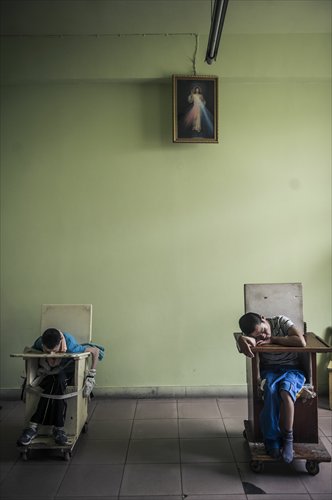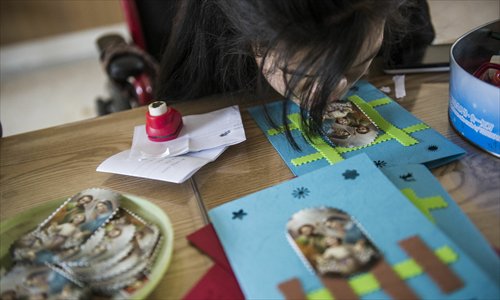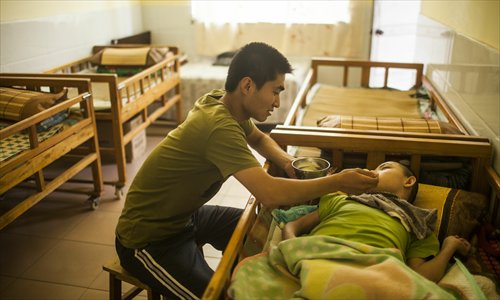Faith or force?

Two children with disabilities sit in the hall of the Liming Family Biancun campus. Photo: Li Hao/GT
Tian Lanlan has never seen a church. She has never seen a statue of Jesus. She has never seen how a religious service is performed. But none of that stopped the blind girl from becoming a devoted Catholic.
Tian, a child of Liming Family, an orphanage run by Catholic nuns in Hebei Province, was born blind. She grew up at the orphanage and grew up with the religion. It brought her inner peace and calmness, she said.
For Tian, praying is as normal as talking and breathing. But recently, regulations and questions have risen over whether it's normal for orphans taken in by religious groups to practice a religion and whether it's within the government's right to regulate them.
In May, the Bureau of Civil Affairs and the State Administration of Religious Affairs jointly published a notice regulating the activities of religious groups who have orphanages. An article of the regulation states that these groups should not force the abandoned children or the orphans to hold religious beliefs.
Last refuge for orphans
Before there was an orphanage, there was a church. Sometimes orphans were abandoned on its doorsteps, in nearby streets, or in the nearby hospital or villages in Ningjin Township, Hebei Province. Wang Delan, a nun at the Tangqiu Catholic Church, told the Global Times that followers brought back abandoned orphans to the church and some took them home to raise as their own.
"The essence of Catholicism is to care about disadvantaged groups and to respect life," she said. "They are all God's children."
In 1988, there were about 10 orphaned children in the surrounding villages and the head of the local Catholic Church decided to establish an orphanage, which later expanded to three facilities.
The entire orphanage is run by nuns, who live at the institute to take care of the children and teach subjects such as English, mathematics or history. Most of the children at the institute have disabilities, and more than 40 percent suffer from various brain disorders, leaving them incapable of taking care of themselves.
The children at the Biancun village facility are almost all confined to bed. The nuns have fed, bathed and dressed the children there for more than 10 years.
The civil affairs bureau published data in 2013 that indicated there were a total of 878 grass-roots orphanages in China, with 9,294 abandoned children. Out of these organizations, 583 had a religious background.
Wei Dedong, vice dean of the School of Philosophy at Renmin University of China, wrote in China Ethics News that taking care of abandoned children isn't an ordinary job, it requires greater patience and attention.
"The primary condition is love … without any religion or spirituality, only living on the encouragement of material world, it's difficult to last in these fields," he wrote.
Wang said the reason she has endured the hard work here for more than 20 years is her religious faith. It's extremely difficult for non-believers to find the strength to carry out the work day after day, year after year, she said.
There are many such organizations in China. Hongde Home, an orphanage established by Buddhist master Changhui in Shijiazhuang, Hebei Province, currently has about 70 children, with only six workers to take care of them.
There are certain advantages to being affiliated with a religious organization, Li Dan, the director of the Shijiazhuang facility, told the Global Times.
"Master Changhui has many devoted followers since he has done charity work for so many years, so there are many long-term donors. Hongde is quite stable in terms of finance," she said.

A child at the Tangqiu orphanage, with disabilities affecting her arms and legs, pieces together a card using her mouth. Photo: Li Hao/GT
Force or choice?
An article of the notice issued in May states religious groups should not force the abandoned children to believe in any religion, which some say has the potential to restrict religious freedom. The civil affairs bureau later defended itself, saying the main purpose of the notice is to regulate charity activities of religious groups, rather than restricting them.
To the religious groups, rituals are just part of normal daily life.
From the outside, it isn't obvious Liming Family has religious affiliations. Rows of buildings stand at the end of a dirt road, and don't look so different from the rural houses in the neighborhood.
Inside the building, a room has been set aside to act as a chapel, and a statue of Christ stands in the corner. Most of the children wear necklaces with Jesus' medallion, pray before meals and attend mass on Sunday.
The nuns regard these as normal daily activities. "It's hard to separate the children from the activities," Wang said. "When the nuns attend mass and pray, the children imitate them," she said.
Tian said her beliefs make her peaceful and calm. She doesn't hide the fact she has been a Catholic for all her life. "It was my free choice," she said.
At Hongde Home, Li said the organization has a rule that all children under 18 may not read Buddhist scriptures or develop religious beliefs. Even though they live at the temple, the monks don't participate in the children's activities and don't interfere with the management of the orphanage.
Yan Kejia, director of the Institute of Religious Studies at the Shanghai Academy of Social Sciences, told the Global Times that the law states one cannot force children under 18 to believe in any religion. However, he said participating in religious activities doesn't mean believing in religion; some religious families send their children to Sunday schools and it's not illegal.
But the fact that these organizations aren't families can pose an issue. First of all, the organizations must not force the children to participate in activities if they are not willing to; and secondly, when they reach 18, they should be able to make a choice about their faiths.
"How can we make sure these children [in the orphanages] can grow up freely? That's the key point in the notice," he said. "How can these children have the final say in whether or not they want a religious life, that's something the religious departments and the government should think about."
In May, media reports also focused on orphans being raised at the Zifeng Temple in Jieyang, Guangdong Province. The temple, with only one monk, has taken in about 60 children abandoned near the temple, and many have serious health problems or disabilities.
Media reports said that the children were raised listening to Buddhist scriptures. Even though the monk doesn't stop the children from choosing other faiths, he prefers the children learn about Buddhist teachings rather than Confucianism.
But there's another side of the story. Grass-roots organizations, especially religious groups, don't have the capacity to raise and care for the children on their own. They need cooperation and support from the government.
Shi Yaogai, the monk at Zifeng Temple, reportedly told the media that he had to take the children, but the temple couldn't afford better caretaking conditions and sometimes had to keep sick children in wooden cages, with a radio playing Buddhist scripture in the background to "wash away their sins."
The children also faced issues in regard to education. It's easy for the monk to teach them Buddhist scriptures, but government cooperation is needed to send the children to school.

A volunteer helps feed a child at Liming Family's Biancun campus. Photo: Li Hao/GT
All are surnamed Heaven
Beyond issues of religious belief, there are more worldly matters to consider. The conditions faced by children, as well as whether they have proper legal recognition, also pose bigger problems.
These issues came to public attention after a fire at an orphanage in Henan Province in 2013. Yuan Lihai, a normal citizen, had taken in more than 40 orphans over the years. Last year, the orphanage caught on fire, killing four children. This led to discussions on the level of government involvement on the matter.
Wang has experienced the same difficulties as other grass-roots charity organizations. The government doesn't recognize such organizations as proper orphanages and it's difficult to register them, Wang said.
Therefore, the most troubling issue with the orphanage is getting the children household registration, or hukou, which are required for many government services. Since the organization isn't recognized and registered as an orphanage, it can't enjoy all the benefits of the national system, such as subsidies, and without hukou the children will find it impossible to get a normal education. Right now, all the children have a collective household registration and all are surnamed Tian (heaven).
With other government departments, Wang has the same issues.
"The police station and local civil affairs bureau don't know what attitude they should hold towards religious organizations. They are not antagonistic, because what we do is a good thing. But since there isn't a specific policy concerning us, they don't dare take care of us," she said.
She has been pushing for more rights and money, writing letters and visiting the government every holiday, hoping the government would notice their problems.
"Raising an orphan shouldn't be the responsibility of grass-roots organizations," Wang said. "It needs cooperation from the government and matching policies."
Li expressed similar concerns. She said it's difficult to find housing for this many children on her own, which is the reason all the children live at the temple hall.
The situation has been improving though. Li said that once the notice comes out, she expects it will be less hassle to register their organizations in the future.
Liming Family has gradually gained some official recognition, due to years of work on Wang's side, and as a result of the notice and previous official papers. The local government and the Association for the Handicapped have been donating money and materials in recent years. Even though the orphanage still runs mostly on donations, Wang said she feels there's dialogue nowadays between the organization and official departments.
"The notice not only regulates the organizations and describes what kind of conditions they must have in order to keep children, but more importantly, accepts them into the society's charity system, treating them at the same level as other grass-roots charity organizations, not as a special category," Yan said.
Wang is optimistic about the future. Even though the local government hasn't given her specific dates, she expects more dealings with the government in the future.
"Facing grass-roots orphanages, what we need is not to deprive them of their religious background and forces, but rather, fully use these groups' activism and help these organizations improve professionally," Wei wrote.
Newspaper headline: Rules barring orphanages from forcing religious belief prompt debate